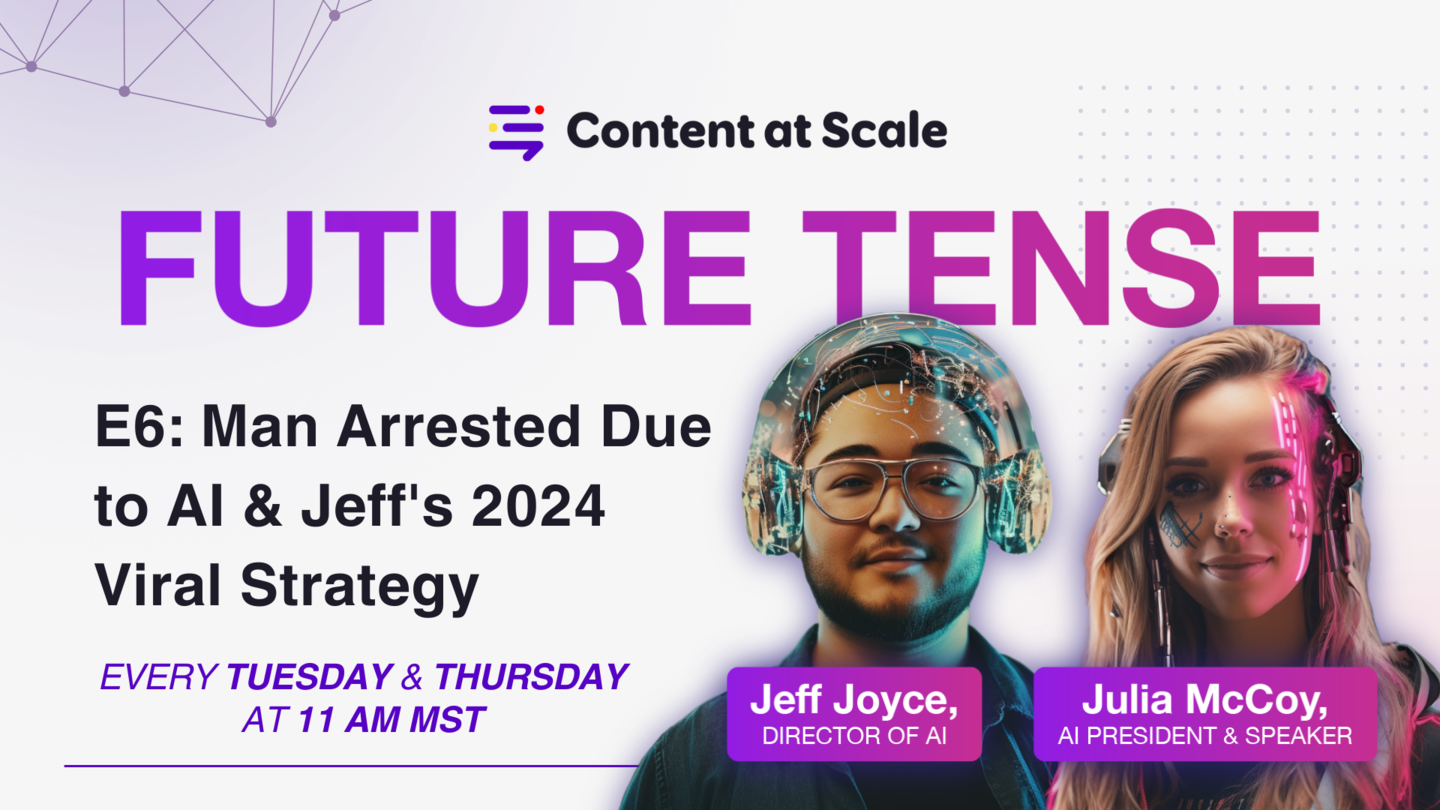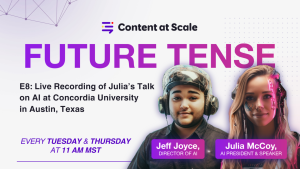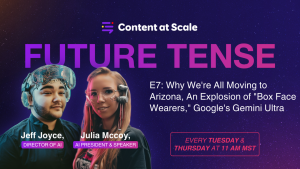You’re scrolling through your phone, and suddenly you see a video that seems tailor-made for you. It’s almost like it knows you better than your best friend. That’s AI at work, folks — especially facial recognition tech, which is reshaping our digital world.
In this week’s podcast, we talked about how smart strategies in AI can ramp up social media numbers big time and why getting facial recognition right matters more now than ever because of its legal implications.
You’ll also get the scoop on adapting content strategy to stay ahead in 2024 and learn just how crucial AI has become for networking on LinkedIn or making headlines react to data collection bots differently.
Listen to all episodes of our show, Future Tense. ✨ It’s the AI show worth listening to; because we’re doing the research, and all the work, to bring you AI news actually worth your time. We cut through the clutter and get to the game-changing info around AI. What you really need to know – like yesterday – to be informed. Listen now on the platform of your choice:
We stream every Tuesday and Thursday: Sub to catch the stream.
The Trust Divide in AI-Generated Content
It’s no secret that the digital landscape is changing with AI at the helm.
A recent survey throws us a curveball – 62% of consumers might turn their backs on content once they sniff out an AI origin story.
Dig deeper, and you’ll see it’s not just black and white; age plays its part too. Gen Z seems to be riding the wave of tech trust more than others, ready to click and engage with what machines churn out.
We’re living in times where your grandpa might distrust a bot-written article while your little cousin shares it like wildfire.
This split-screen scenario shows younger folks often give a thumbs up to AI-generated reads, making marketers scratch their heads about who trusts what online these days.
The Impact of AI on Social Media
Artificial intelligence is changing the game for social media growth.
Think about those captivating AI-generated videos that are popping up everywhere — they’re not just eye candy, they’re serious engagement magnets.
Jeff Joyce’s experiment with video content on social media got 90,600 views on YouTube and picked up 17,313 Facebook fans and 3,056 Instagram followers, all in 5 months of using AI.
Boosting Engagement Through AI Videos
Videos that rack up 500,000 views don’t just happen by chance. They’re the result of smart strategy and understanding what clicks with audiences.
A key tactic is leveraging AI to analyze performance data and fine-tune content for maximum impact.
Social media loves snappy, engaging clips, and videos made with artificial intelligence can turn heads and get people talking.
This isn’t just guesswork; we saw an experiment rack up 1.1 million views on video shorts alone.
Short-Form Content’s Viral Potential
Bite-sized content has massive viral potential when it’s powered by AI.
Suddenly, your message could be reaching audiences you never thought possible — it’s like finding a shortcut to online popularity.
Navigating the Legal Landscape of Facial Recognition Technology
Picture this: you’re walking down the street, minding your own business, when suddenly you get picked up by the police for a crime you didn’t commit.
This isn’t a scene from a dystopian novel — it’s what can happen when facial recognition gets it wrong.
A man recently found himself in handcuffs due to such an error, turning his life upside down and sparking legal debates.
The Need for Reliable Facial Recognition
Accuracy is crucial in facial recognition tech.
Mistakes are more than glitches — they lead to real-world consequences like wrongful arrests and invasions of privacy that shake our trust in technology.
We need systems we can rely on because someone’s freedom could be at stake. Let’s make sure our advancements don’t come at too high a cost.
Adapting Content Strategy for 2024
Think of a long-form video as the Swiss Army knife in your content toolkit.
You start with a solid base, then slice and dice it into formats that each social platform loves to gobble up.
Take Jeff Joyce’s strategy; he doesn’t just post his videos — he carves them into bite-sized pieces tailored for YouTube and TikTok audiences.
The secret sauce? It’s repurposing.
You create once but get multiple servings of content out of it — blog posts, tweets, even Instagram stories all from one single video source.
Your goal is simple: grab eyeballs everywhere they roam online. So you snip highlights from your main event — the long-form video — and serve them up where folks are scrolling right now.
On platforms buzzing with activity, these nuggets can lead curious clickers back to the full feast on your channel.
The Role of AI in Enhancing LinkedIn Engagement
Imagine your LinkedIn profile as a buzzing hub where professionals flock to share insights and opportunities.
Leveraging AI, you can craft posts that resonate with this crowd, making your voice heard above the din.
AI helps analyze trends so you know what’s hot and what’s not.
This savvy approach has helped users build impressive followings by pushing engagement through the roof on their content feeds.
We’re talking about real numbers here: think about growing your connections and having more meaningful interactions daily.
In fact, employing these smart tools is slated to be a game-changer for personal branding strategies in 2024.
Media Outlet Responses to AI Data Collection
Imagine a world where your every online move is tracked.
Mainstream news sites are putting up walls against this by blocking AI data collection bots.
In contrast, right-wing media outlets seem more open, often allowing these digital sleuths free rein on their platforms.
This isn’t just about privacy; it’s a question of control over the narrative.
Mainstream sources aim to protect their content and reader data from potential misuse or unsanctioned distribution. They make sure only human eyes can curate and interpret their stories because context matters — and algorithms don’t always get that part right.
On the flip side, some argue that right-leaning platforms may benefit from increased circulation through bot engagement — content gets shared wider and faster than ever before when not blocked by anti-bot measures. This openness could potentially amplify messages but also raises questions about accuracy as well as vulnerability to misinformation campaigns.
Conclusion
Think about it: AI and facial recognition are game-changers. We’ve seen how they can make content that hits the mark, getting those likes and shares through the roof.
We learned Gen Z’s cool with AI-made stuff. They’re clicking away while other generations might still be on the fence.
Tackle legalities head-on; remember that man who got arrested after a false ID? Facial recognition goof-ups aren’t just awkward — they have real-world fallout.
Pivot to strategy — 2024 is coming fast, folks. Videos turned into every kind of post imaginable? That’s how you stay ahead.
Switch gears to LinkedIn — AI’s making waves there too. It’s all about smart posts for smarter networking.
Last up, media outlets are split on AI bots collecting their data. Some block ’em out; others roll out the welcome mat— it’s a mixed bag out there!




